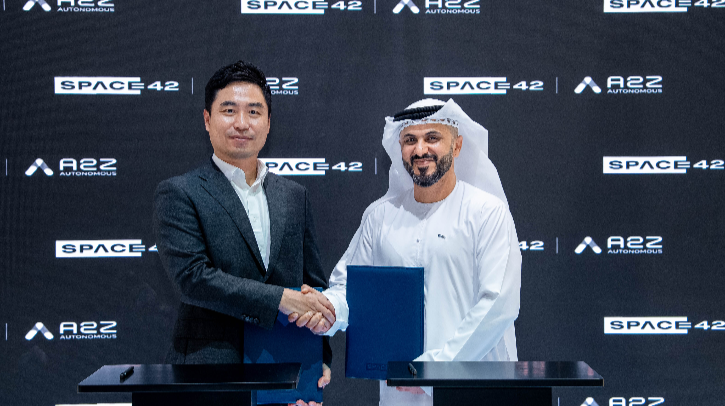
Space42, formed in 2024 by the merger of Bayanat and Yahsat with backing from major stakeholders including G42, Mubadala and IHC, brings advanced geospatial analytics, AI and satellite communications capabilities to the partnership. Autonomous A2Z, founded in 2018 by former Hyundai Motor engineers, develops full core systems for Level-4 autonomy and has operated South Korea’s largest autonomous vehicle fleet.
The venture will initially deploy a five-vehicle autonomous fleet in Abu Dhabi and Dubai, converting existing vehicles into self-driving systems rather than building entirely new assets. By establishing local R&D and integration workshops, the partners aim to anchor manufacturing and innovation locally. The venture also aims to support the UAE’s goals of making up to 25 per cent of all trips autonomous by 2030 in Dubai and 2040 in Abu Dhabi, working closely with the Abu Dhabi Investment Office and the Smart and Autonomous Vehicle Industries cluster.
Analysts say the go-to-market strategy of focusing on retrofit and V2X frameworks reflects a pragmatic recognition of the cost and complexity of fully autonomous fleet deployment. By enabling current fleet operators in public transport, logistics, industrial zones, airports and municipal services to adopt autonomy without wholesale replacement, the venture lowers the barrier to entry for autonomous mobility adoption. However, challenges remain around regulation, infrastructure readiness, safety certification and consumer acceptance, especially given the leap to Level 4 autonomy which implies driver-less operation in defined conditions.
Space42’s broader business-performance context shows the company achieved revenue of US$363 million in the first nine months of 2025, despite a 15 per cent decline linked to the Smart Solutions business restructuring. Normalised net profit stood at US$61 million and future contracted revenues were reported at US$6.7 billion. The autonomous mobility initiative forms part of its diversification beyond satellite services. The timing suggests the JV addresses both a national smart-mobility agenda and Space42’s strategic shift from legacy projects to scalable, data-driven platforms.
For Autonomous A2Z, entry into the UAE market provides a valuable export path for its technology and a higher-visibility platform in a region aggressively promoting smart mobility. Its prior achievements include the development of the Level-4 vehicle “ROii” and its selection as the official autonomous operator for the APEC 2025 summit in Korea. The firm’s placement at 11th on the 2024 Guidehouse Insights Autonomous Driving Leaderboard—the only Korean company in that tier—bolsters its credibility in advanced autonomy deployment.
Regional implications of the venture extend beyond the two companies. The UAE’s ambition to become a global test-bed for mobility innovation aligns with its wider Smart Cities and digital economy strategies. For fleet operators, local authorities and technology providers, the JV signals a shift toward commercial readiness rather than purely pilot programmes. Industry observers note that the retrofit-first model could provide a faster ramp to scale than new vehicle builds. Yet they caution that retrofit programmes must ensure strict safety, cybersecurity, and interoperability standards—areas where regulatory frameworks across the region are still maturing.
Navigating public acceptance remains a key hurdle. While autonomous taxis and shuttles have operated in limited zones, widespread usage demands transparent data on safety, reliability and cost. A joint research piece by vehicle-automation oversight groups emphasises the need for occupant trust, clear regulatory liability regimes and adaptive traffic-management systems to make full autonomy viable. The JV acknowledges this by building local testing and R&D capacity, but actual commercialisation will depend on demonstrating consistent operation under live conditions rather than controlled pilots.
From a competitive standpoint, the venture places Space42 and Autonomous A2Z in direct alignment with global players expanding into the Middle East. Developed markets in Europe, North America and Asia are already advancing robotaxi programmes, but the UAE’s controlled regulatory environment, high capital intensity and national mobility targets create a favourable climate for accelerated deployment. The JV thus could act as a regional hub, with prospective expansion into logistics, tourism and industrial applications beyond taxis and shuttles.
While the partnership offers significant upside in aligning with national policy and deploying advanced technology, it carries risks tied to execution, infrastructure readiness, regulatory alignment and customer-adoption velocity. Early pilot performance, clarity on liability frameworks, connectivity backbone readiness and the ability to retrofit diverse vehicle types will all matter in transitioning from demonstration to full commercial rollout. The JV’s success will depend not just on the hardware but on integration across mapping, sensor, AI, V2X and fleet-management layers—an orchestration that many industry programmes have found challenging.
Topics
Live News
